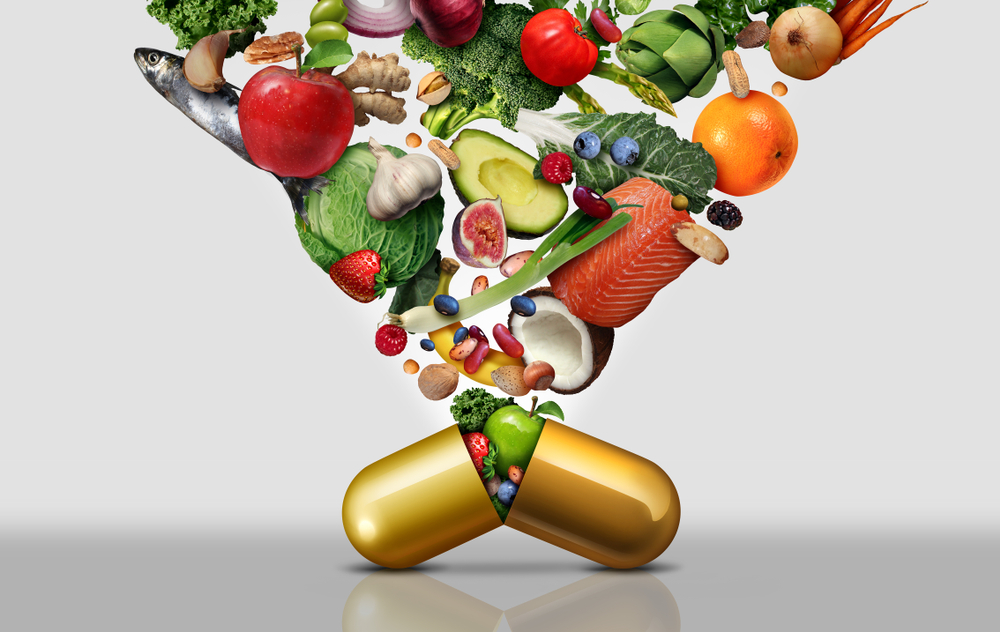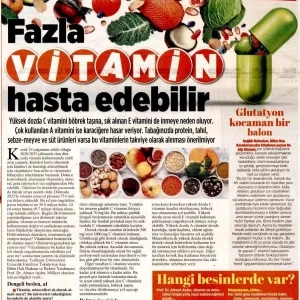
High doses of Vitamin C can lead to kidney stones, frequent intake of Vitamin E can cause stroke, and excessive use of Vitamin A can damage the liver. If your plate has protein, grains, fruits-vegetables, and dairy products, taking these vitamins as supplements is not recommended.
During the Covid-19 pandemic between 2020-2023, vitamin usage was significantly increased worldwide. Some people turned to vitamins to avoid getting sick, while others used them to recover from the disease, leading to unconscious consumption of vitamins. Vitamins, minerals, and dietary supplements not taken under a doctor's supervision can affect your health. Consumption also caused a significant increase in the market for these products. In 2023, the global market for vitamins and minerals reached $55.6 billion. The market growth projected for this year is $58.8 billion, which is estimated to reach $99.7 billion in ten years. In the series of articles we are publishing starting today, we will present the rights and wrongs of using dietary supplements, vitamins, and similar products with information from experts. Do we consult our doctor, or do we trust our pharmacist? Can't we also get vitamins from our diet? Does Glutathione really work? Will getting so much support for our body cause damage to our organs? You will find the answers to these questions. Prof. Dr. Ahmet Aydın, Head of the Department of Toxicology at the Faculty of Pharmacy, Yeditepe University, and Vice-Rector, provided his insights for Milliyet readers…"
■ Should we take vitamins and minerals as supplements? Can we get these supplements from the food we eat?
Vitamins and minerals should be obtained naturally through our food. Since all vitamins and minerals are the foundation of nature and biology, these components are sufficiently found in our plant and animal-sourced foods. We can obtain these vitamins naturally with a balanced diet. If your plate includes protein, grains, vegetables, fruits, and dairy products, it means you are eating a balanced diet. Such a balanced diet implies that vitamins and minerals will be adequately obtained. An adult's daily need for Vitamin C is about 70 mg. This amount can easily be met with a daily balanced diet. Just one glass of orange juice can quickly meet this amount of Vitamin C.
The products offered as supplements contain 500 mg or 1000 mg of Vitamin C. As can be seen, a very high amount of Vitamin C is obtained as a supplement. This increased amount should only be recommended by a health professional when needed in the case of illness and should be taken for a short period, like a few days.
On the other hand, Vitamin C is not stored in the body. The more you take, the more it is excreted. This fact should be kept in mind, and it should not be forgotten that long-term high doses of Vitamin C can lead to stomach burns, kidney stones, and oxidation in the body.
■ When should vitamins and minerals be taken as additional supplements?
Any support should be recommended by a health professional like a doctor or pharmacist. The deficiency of vitamins or minerals should be identified through blood tests.
■ What health risks can arise from the uncontrolled use of supplemental vitamins and minerals?
While an adequate dose of Vitamin C protects against oxidation, a high dose of Vitamin C can lead to oxidation and the formation of kidney stones. Long-term use of high doses of Vitamin E can prevent clotting, leading to stroke. High doses of Vitamin A can cause dry skin, loss of appetite, joint pains, and liver damage. Continually uncontrolled use of minerals in high doses as a supplement can lead to various unwanted effects for each mineral. On the other hand, in individuals who are chronically using medications, supplements can lead to unwanted drug interactions.
What foods contain them?
Prof. Dr. Ahmet Aydın explained how we can naturally obtain vitamins and minerals...
Vitamin B
Whey is an important source of Vitamin B and provides a large part of our daily need
Vitamin A
A serving of liver (from large animals) provides five times our daily need for Vitamin A..
Vitamin E
Fatty foods (wheat oil, sunflower oil, almonds, hazelnuts, and similar) are an important source of Vitamin E. Just one tablespoon of sunflower oil meets 28% of our daily Vitamin E needs.
Magnesium, Zinc
Almost every food contains varying amounts of minerals like copper, zinc, selenium, manganese, magnesium, calcium, and phosphorus.
Glutathione
NAD and Glutathione are natural components of our body. These substances are used against various biological reactions and toxic substances and metabolites, turning into an inactive form. Our body reactivates these substances. This process continues indefinitely: they are used, inactive, and then reactivated by the body.
